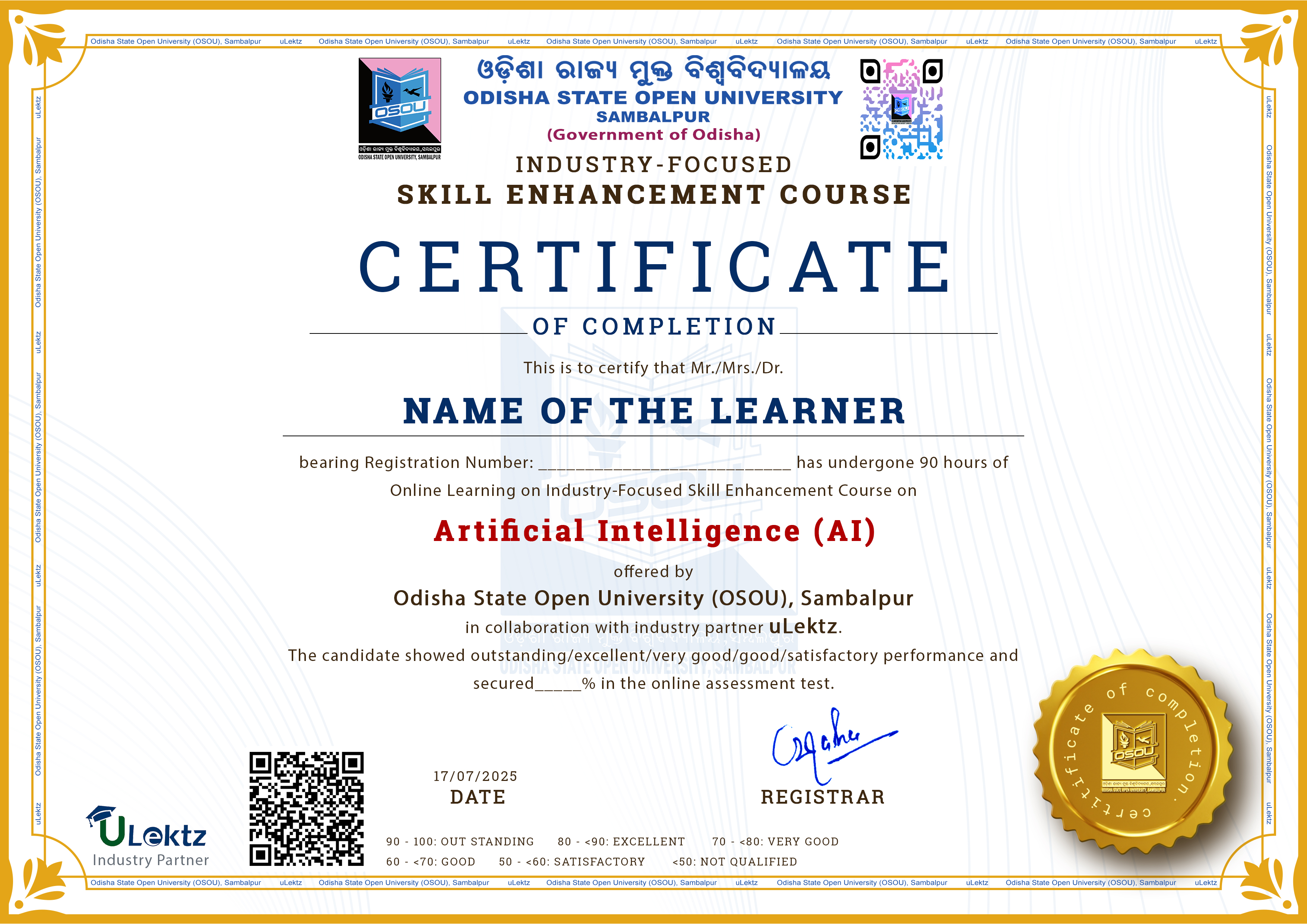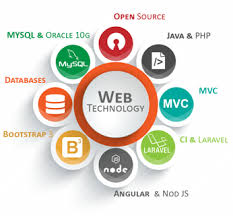

Note: Please check your Spam or Junk folder, in case you didn't receive the email with verification code.
Non-Linear: Random Order
Course Objectives
1. Provide a solid foundation in web development concepts, tools, and technologies.
2. Develop skills in designing and building responsive, accessible, and interactive web applications.
3. Understand server-side and client-side technologies for dynamic web development.
4. Explore modern web development frameworks and best practices.
5. Prepare students for careers in web development and related fields.
Learning Outcomes
By the end of the course, students will be able to:
1. Design and develop responsive web pages using HTML, CSS, and JavaScript.
2. Build and deploy dynamic web applications using server-side technologies.
3. Integrate databases into web applications for data-driven functionality.
4. Apply modern web development frameworks for front-end and back-end development.
5. Utilize version control and collaborative tools for effective web development workflows.
Skills Developed
• Proficiency in front-end technologies (HTML, CSS, JavaScript)
• Experience in building full-stack web applications
• Database integration and management skills
• Knowledge of web security best practices
• Collaborative development using Git and project management tools
Career Pathways
• Front-End Web Developer
• Back-End Web Developer
• Full-Stack Developer
• Web Designer
• UI/UX Developer
• DevOps Engineer (Web Applications)
.
 1.1 Evolution of the Web and Web Standards
1.1 Evolution of the Web and Web Standards
 1.2 Overview of Web Development Process
1.2 Overview of Web Development Process
 1.3 Basics of Internet and Web Protocols
1.3 Basics of Internet and Web Protocols
 1.4 Overview of ClientSide VS ServerSide Technologies
1.4 Overview of ClientSide VS ServerSide Technologies
 1.5 Role of Web Developers
1.5 Role of Web Developers
 For Reference: Inernet Technologies
Duration:
For Reference: Inernet Technologies
Duration:
 Unit1 Test
10 Questions
Unit1 Test
10 Questions
 Introduction to Web Technologies
Duration:
Introduction to Web Technologies
Duration:
 2.1 Structure of HTML Documents
2.1 Structure of HTML Documents
 2.2 Semantic HTML and Accessibility
2.2 Semantic HTML and Accessibility
 2.3 Forms and Input Validation
2.3 Forms and Input Validation
 2.4 Multimedia Elements
2.4 Multimedia Elements
 2.5 HTML APIs
2.5 HTML APIs
 For Reference: HTML essential
Duration:
For Reference: HTML essential
Duration:
 Unit2 Test
10 Questions
Unit2 Test
10 Questions
 HTML5 essentials
Duration:
HTML5 essentials
Duration:
 3.1 CSS Syntax and Selectors
3.1 CSS Syntax and Selectors
 3.2 Responsive Design with Flexbox and Grid
3.2 Responsive Design with Flexbox and Grid
 3.3 CSS Animations and Transitions
3.3 CSS Animations and Transitions
 3.4 Preprocessors
3.4 Preprocessors
 3.5 Best Practices for CSS Organization
3.5 Best Practices for CSS Organization
 For Reference: CSS style sheets
Duration:
For Reference: CSS style sheets
Duration:
 Unit3 Test
10 Questions
Unit3 Test
10 Questions
 Cascading Style Sheets
Duration:
Cascading Style Sheets
Duration:
 4.1 JavaScript Syntax and DOM Manipulation
4.1 JavaScript Syntax and DOM Manipulation
 4.2 Event Handling and User Interaction
4.2 Event Handling and User Interaction
 4.3 Introduction to ES6
4.3 Introduction to ES6
 4.4 Form Validation with JavaScript
4.4 Form Validation with JavaScript
 4.5 Debugging JavaScript Applications
4.5 Debugging JavaScript Applications
 For Refernce: Javascript
Duration:
For Refernce: Javascript
Duration:
 Unit4 Test
10 Questions
Unit4 Test
10 Questions
 Javascript Basics
Duration:
Javascript Basics
Duration:
 5.1 Asynchronous Programming
5.1 Asynchronous Programming
 5.2 Introduction to JavaScript Frameworks
5.2 Introduction to JavaScript Frameworks
 5.3 State Management in Front-End Frameworks
5.3 State Management in Front-End Frameworks
 5.4 Component-Based Development
5.4 Component-Based Development
 5.5 Building Single Page Applications (SPA)
5.5 Building Single Page Applications (SPA)
 For Reference: Angular vs React vs Vue
Duration:
For Reference: Angular vs React vs Vue
Duration:
 Unit5 Test
10 Questions
Unit5 Test
10 Questions
 Advance JavaScript Frameworks
Duration:
Advance JavaScript Frameworks
Duration:
 6.1 Introduction to Git and GitHub
6.1 Introduction to Git and GitHub
 6.2 Version Control Workflow
6.2 Version Control Workflow
 6.3 Setting Up Collaborative Development Projects
6.3 Setting Up Collaborative Development Projects
 6.4 Using GitHub Actions for CI or CD
6.4 Using GitHub Actions for CI or CD
 6.5 Code Review and Documentation Practices
6.5 Code Review and Documentation Practices
 For Reference: GitHuB
Duration:
For Reference: GitHuB
Duration:
 Unit6 Test
10 Questions
Unit6 Test
10 Questions
 Version Control
Duration:
Version Control
Duration:
 7.1 Basics of Server-Side Scripting
7.1 Basics of Server-Side Scripting
 7.2 Building RESTful APIs
7.2 Building RESTful APIs
 7.3 Introduction to Web Servers
7.3 Introduction to Web Servers
 7.4 Authentication and Authorization
7.4 Authentication and Authorization
 7.5 Session Management and Cookies
7.5 Session Management and Cookies
 For Reference: Server-side scripting
Duration:
For Reference: Server-side scripting
Duration:
 Unit7 test
10 Questions
Unit7 test
10 Questions
 Serverside Development
Duration:
Serverside Development
Duration:
 8.1 Introduction to Relational Databases
8.1 Introduction to Relational Databases
 8.2 NoSQL Databases
8.2 NoSQL Databases
 8.3 CRUD Operations in Web Applications
8.3 CRUD Operations in Web Applications
 8.4 Database Design and Optimization
8.4 Database Design and Optimization
 8.5 Connecting Databases to Web Applications
8.5 Connecting Databases to Web Applications
 For Reference:Database Management
Duration:
For Reference:Database Management
Duration:
 Unit 8 Test
10 Questions
Unit 8 Test
10 Questions
 Database Integration
Duration:
Database Integration
Duration:
 9.1 Common Web Vulnerabilities
9.1 Common Web Vulnerabilities
 9.2 Secure Coding Practices
9.2 Secure Coding Practices
 9.3 HTTPS and SSL Certificates
9.3 HTTPS and SSL Certificates
 9.4 Content Security Policies
9.4 Content Security Policies
 9.5 Tools for Security Auditing
9.5 Tools for Security Auditing
 For Reference:Web security
Duration:
For Reference:Web security
Duration:
 Unit9 Test
10 Questions
Unit9 Test
10 Questions
 Web Security
Duration:
Web Security
Duration:
 10.1 Webpack Babel and Build Tools
10.1 Webpack Babel and Build Tools
 10.2 Package Managers
10.2 Package Managers
 10.3 Deployment Tools and Strategies
10.3 Deployment Tools and Strategies
 10.4 Progressive Web Apps
10.4 Progressive Web Apps
 10. 5 Testing Web Applications
10. 5 Testing Web Applications
 For Reference: Modern Web Dev Stack
Duration:
For Reference: Modern Web Dev Stack
Duration:
 Unit10 Test
10 Questions
Unit10 Test
10 Questions
 Modern Web Development Tools
Duration:
Modern Web Development Tools
Duration:
 11.1 Introduction to Web 3.0 and Decentralized Apps
11.1 Introduction to Web 3.0 and Decentralized Apps
 11.2 AI and ML in Web Development
11.2 AI and ML in Web Development
 11.3 WebAssembly and Its Applications
11.3 WebAssembly and Its Applications
 11.4 Real-Time Web Applications (WebSockets, SignalR)
11.4 Real-Time Web Applications (WebSockets, SignalR)
 11.5 Low Code No Code Web Development Platforms
11.5 Low Code No Code Web Development Platforms
 For Refernce: Low code or No code
Duration:
For Refernce: Low code or No code
Duration:
 Unit11 Test
10 Questions
Unit11 Test
10 Questions
 Emerging Trends in Web Development
Duration:
Emerging Trends in Web Development
Duration:
 12.1 Designing and Developing a Full-Stack Web Application
12.1 Designing and Developing a Full-Stack Web Application
 12.2 Deployment of a Web Application on Cloud
12.2 Deployment of a Web Application on Cloud
 12.3 Peer Review and Feedback on Projects
12.3 Peer Review and Feedback on Projects
 12.4 Case Studies of Popular Web Applications
12.4 Case Studies of Popular Web Applications
 12.5 Reflective Learning through Project Challenges
12.5 Reflective Learning through Project Challenges
 For Refernce:Cloud computing
Duration:
For Refernce:Cloud computing
Duration:
 Unit 12 Test
10 Questions
Unit 12 Test
10 Questions
 Capstone Project
Duration:
Capstone Project
Duration:
 Final Assessment
30 Questions
Final Assessment
30 Questions
The certificate issued for the Course will have
Only the e-certificate will be made available. No Hard copies. The certificates issued by Odisha State Open University, Sambalpur. can be e-verifiable at www.ulektzskills.com/verify.



 90 hours Learning Content
90 hours Learning Content 100% online Courses
100% online Courses English Language
English Language Certifications
Certifications